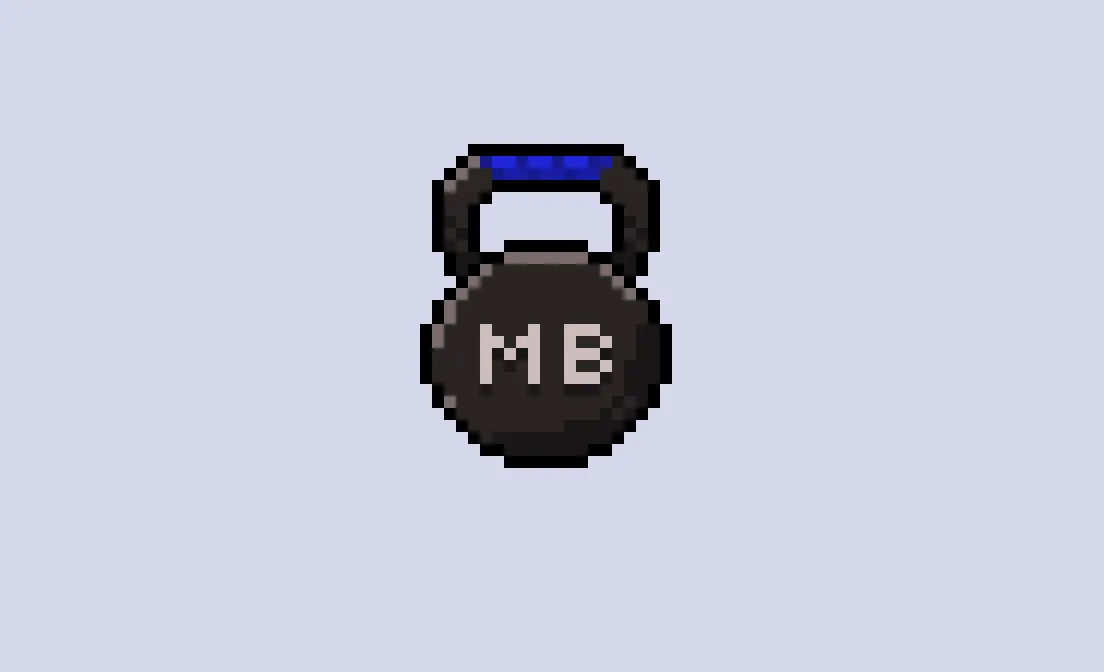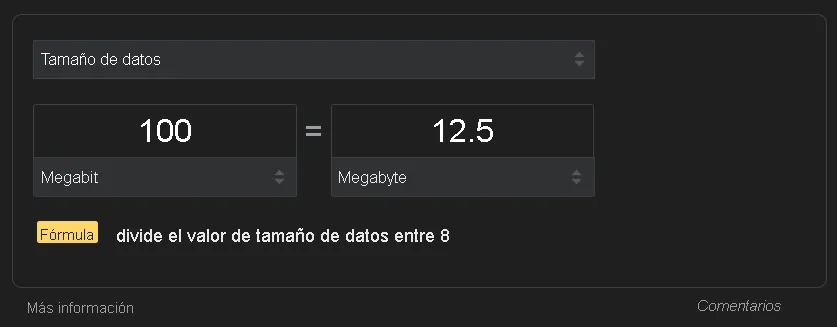Versión en Español
¿Qué velocidad de internet poseo?
Intro
Hola. En este post voy a enseñar cómo calcular la velocidad de tu internet. O cómo calcular la velocidad de un plan de internet. Por si aún no lo has comprado y estás decidiendo.
Hay muchas cosas sobre tecnología con las que interactuamos a diario. Pero realmente no somos conscientes del todo sobre cómo funcionan.
Una de estas cosas, en mi caso, era la velocidad del internet que estaba contratado.
La verdad me parecía que saber la velocidad del internet era algo sencillo, pero me di cuenta de que hay una confusión común.
Esto pasó ya hace muchos años cuando me enteré de cómo era realmente. Y ahora pienso compartírtelo.
¿Tienes un internet de 100 y está bajando a 10?
Para poder entender el porqué nunca descargamos a la velocidad que nos dice la empresa que nos provee de internet, primero debemos entender dos tipos de medidas.
Las cuales son Megabit y Megabyte.
Sí.
Al entender estos dos términos sabrás lo que está sucediendo.
Megabit (Mb)
Te lo diré con mis propias palabras. El megabit es una forma de medida de velocidad en internet. Los datos viajan de un lugar a otro. Por ejemplo desde una web a un dispositivo.
Así como tenemos una medida para un carro de Kilómetros por hora (Km/h). Tenemos una para los datos, de megabits por segundos (Mbps).

Megabyte (MB)
El megabyte, es una medida que indica el tamaño de datos de algún archivo. También nos puede indicar la capacidad de una memoria de datos.
Puedes compararlo con la forma en la que medimos el peso de las cosas físicas, como los alimentos. Gramos, kilogramos, etc. Así como podemos medir cuánto pesa algún alimento en gramos (g). Podemos medir cuánto pesa algún archivo en megabyte (MB).

¿Ya te aprendiste estos términos?
Bueno volvemos a la duda ¿por qué si mi internet es de 100 yo descargo archivos a 10?
Lo que sucede es que confundimos los megabits con megabytes. Las empresas de internet hacen sus campañas basándose en la velocidad que venden. Y la medida que nos aparece al descargar es el tamaño del archivo que está en proceso de descarga.
Si se está descargando a la velocidad que nos vendieron. Solo que lo que observamos es el peso del archivo siendo descargado.
¿Entonces qué es lo que sucede?
Muchas preguntas pequeño Watson.
Lo que sucede es que 1 Megabyte equivale a 8 megabits.
1 MB = 8 Mb
Las empresas cuando te venden un plan de internet te hablan en megabits. Así que cuando te dicen 100 megas, son 100 megabits. Esto porque es la medida para la velocidad de transferencia de datos en internet. 100 megabits equivale a 12.5 Megabytes.

También que la diferencia entre sus símbolos es el tamaño de la "b". Si lleva una "b" hablamos de megabit (Mb) y si tiene una "B" es megabyte (MB).
Conclusión
Lo único que tienes que saber para calcular tu velocidad de descarga, es dividir entre 8 la cantidad que te dice la empresa de internet. Si te dice que es un plan de 30 megas, 30/8= 3.75. Descargarás a 3.75 MB.
Lo que nos suele aparecer de información en la descarga son los megabytes (MB). Si has descargado cosas antes y te has fijado en su peso. Ya deberías poder deducir cuánto tiempo te tomaría descargar un archivo de 100 MB a 3.75. Lo cual es un internet con una velocidad de 30 Mb. Son unos pocos minutos de descarga.
Por alguna razón en los navegadores al iniciar una descarga nos aparece la información del peso de datos a descargar y cómo está siendo descargado equivalente a nuestra velocidad en megabits.
Esto es todo por ahora. Nos vemos en otro post. ¡Gracias por leer!.
Los pixels arts usados en esta publicación fueron creador por mi en Piskel. © Todos los derechos reservados .
English Version
What Internet Speed Do I Have?
Introduction
Hello. In this post, we're going to learn how to calculate your internet speed. Or how to calculate the speed of an internet plan if you haven't purchased one yet and are deciding.
There are many things about technology that we interact with daily. But we're not fully aware of how they really work.
One of these things, in my case, was the speed of the internet I was subscribed to.
Truth be told, knowing internet speed seemed simple to me, but I realized there's a common confusion.
This happened many years ago when I learned what it really meant. And now I think I should share it with you.
Do You Have 100 Internet and It's Downloading at 10?
In order to understand why we never download at the speed the company providing us with internet tells us, we first need to understand two types of measurements.
These are Megabit and Megabyte.
Yes.
By understanding these two terms, you'll know what's happening.
Megabit (Mb)
Let me put it in my own words. A megabit is a measure of internet speed. Data travels from one place to another. For example, from a website to a device.
Just as we have a measure for a car in Kilometers per hour (Km/h), we have one for data, in megabits per second (Mbps).

Megabyte (MB)
Megabyte is a measure indicating the size of data in a file. It can also indicate the capacity of a data memory.
You can compare it to how we measure the weight of physical things, like food. Grams, kilograms, etc. Just as we can measure the weight of food in grams (g), we can measure the weight of a file in megabytes (MB).

Have You Learned These Terms Yet?
So, back to the question, why if I have 100 do I download files at 10?
The thing is, we confuse megabits with megabytes. Internet companies base their campaigns on the speed they sell. And the measurement that appears when we download is the size of the file being downloaded.
And if it's downloading at the speed they sold us. It's just that what we're seeing is the weight of the file being downloaded.
So, What's Actually Happening?
Many questions, my dear Watson.
What's happening is that 1 Megabyte equals 8 megabits.
1 MB = 8 Mb
When internet companies sell you an internet plan, they talk about megabits. So when they say 100 megas, it's 100 megabits. This is because it's the measure of data transfer speed on the internet. 100 megabits equals 12.5 Megabytes.

Also, the difference between their symbols is the size of the "b". If it's a "b", it's a megabit (Mb), and if it's a "B", it's a megabyte (MB).
Conclusion
All you need to know to calculate your download speed is to divide the amount the internet company tells you by 8. If they say it's a 30-megabit plan, 30/8 = 3.75. You'll download at 3.75 MB.
What usually appears in download information are megabytes (MB). If you've downloaded things before and paid attention to their size, you should be able to deduce how long it would take you to download a 100 MB file at 3.75. Which is an internet speed of 30 Mb. It's just a few minutes of download.
For some reason, browsers show us the information of the data weight to be downloaded and how it's being downloaded equivalent to our speed in megabits when starting a download.
That's all for now. See you in another post. Thanks for reading!
The pixel arts used in this post were created by me on Piskel. © All rights reserved.
